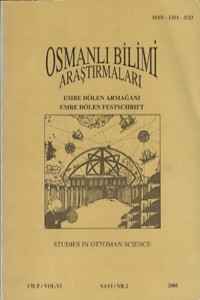The Ottoman press cover age of the 1865 choler a epidemic and Mir za Malkom Khan's argument in the Istanbul International Sanitary Confer ence
Öz
This presentation is an analysis of the “islamic” reaction verbalized by
Malkom Khan, Iranian diplomat in Istanbul, in face of the cholera epidemic of
1865, as reflected in the contemporary Ottoman press. In this year, a cholera
epidemic believed to have spread from Hijaz during the pilgrimage season, raged
through major Ottoman cities and reached Europe. The presumption was that the
epidemic had reached the Mediterranean from the ports of Egypt, and European
states demanded that the pilgrimage (Hajj) of the next year should be curtailed. Sanctions by the Egyptians and Ottoman authorities were deemed to be
ineffective. The Ottoman government accepted the French request in December
1865 for the commencement of an international sanitary conference on the
condition that it be held in Istanbul. The muslim view was presented by the
Ottoman and Iranian delegates in the conference which opened in January 1866
and continued for nine months. The Ottoman representatives were Ali Pasha, the
Foreign Minister, Dr. Salih Efendi, Deputy Minister for the School of Medicine, and Dr. Bartoletti; Egypt was represented by Dr. Lautner, and Iran by Mirza
Malkom Khan (18331908), consultant in the Iranian embassy in Istanbul, who
was accompanied by two physicians.
The French government demanded strict travel restrictions on the Red Sea, because this maritime line was seen as the cause of dissemination of the disease. The alternative proposed was that the pilgrims return either by the camel caravan
route over the desert or that the vessels from Jeddah disembark at a distant port
where the passengers were to be quarantined.
Mirza Malkom Khan delivered a long argument against the French
demand, which was supported by Dr. Bartoletti, one of the Ottoman delagates at
the conference. Malkom Khan explained that the pilgrims would perish in the
desert journey, and expressed his support to a second plan conceived by the
Ottoman delegation, which accepted the enforcement of the quarantine and the
protection of the pilgrims against mistreatment.
Anahtar Kelimeler
Malkom Khan cholera epidemic pilgrimage Hajj Mecca quarantines Istanbul Sanitary Conference (1866)
Kaynakça
- -
Öz
This presentation is an analysis of the “islamic” reaction verbalized by Malkom Khan, Iranian diplomat in Istanbul, in face of the cholera epidemic of 1865, as reflected in the contemporary Ottoman press. In this year, a cholera epidemic believed to have spread from Hijaz during the pilgrimage season, raged through major Ottoman cities and reached Europe. The presumption was that the epidemic had reached the Mediterranean from the ports of Egypt, and European states demanded that the pilgrimage (Hajj) of the next year should be curtailed. Sanctions by the Egyptians and Ottoman authorities were deemed to be ineffective. The Ottoman government accepted the French request in December 1865 for the commencement of an international sanitary conference on the condition that it be held in Istanbul. The muslim view was presented by the Ottoman and Iranian delegates in the conference which opened in January 1866 and continued for nine months. The Ottoman representatives were Ali Pasha, the Foreign Minister, Dr. Salih Efendi, Deputy Minister for the School of Medicine, and Dr. Bartoletti; Egypt was represented by Dr. Lautner, and Iran by Mirza Malkom Khan (18331908), consultant in the Iranian embassy in Istanbul, who was accompanied by two physicians.
The French government demanded strict travel restrictions on the Red Sea, because this maritime line was seen as the cause of dissemination of the disease. The alternative proposed was that the pilgrims return either by the camel caravan route over the desert or that the vessels from Jeddah disembark at a distant port where the passengers were to be quarantined.
Mirza Malkom Khan delivered a long argument against the French demand, which was supported by Dr. Bartoletti, one of the Ottoman delagates at the conference. Malkom Khan explained that the pilgrims would perish in the desert journey, and expressed his support to a second plan conceived by the Ottoman delegation, which accepted the enforcement of the quarantine and the protection of the pilgrims against mistreatment.
Anahtar Kelimeler
Kaynakça
- -
Ayrıntılar
| Birincil Dil | Türkçe |
|---|---|
| Bölüm | Araştırma Makaleleri |
| Yazarlar | |
| Yayımlanma Tarihi | 1 Haziran 2005 |
| Yayımlandığı Sayı | Yıl 2005 Cilt: 6 Sayı: 2 - Emre Dölen Armağanı Cilt:6 sayı:2 |

